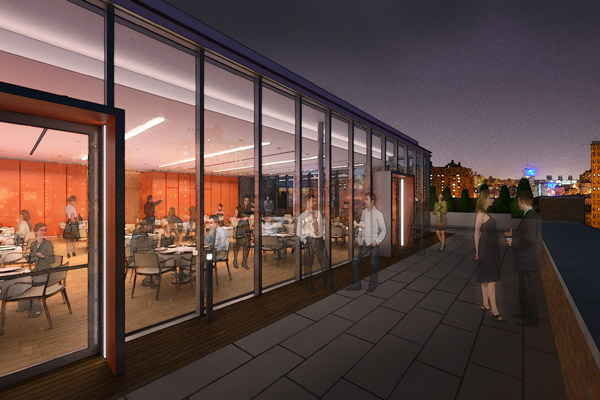
The Manny Cantor Center’s new rooftop space, offering sweeping views, will be available for community events and rentals.
BY HEATHER DUBIN | The old and new are coming together at the Educational Alliance, as the former Lower East Side settlement house is moving toward completion of a $59 million renovation of its historic flagship building.
The project by the community-based nonprofit organization preserves the facade of its 197 East Broadway building, which — once the two-year-long gut rehab is finished — will house the Manny Cantor Center. The center will include a reception space for community events, a fitness floor, expanded senior and teen centers, an art school with light-filled studios, and ample room for early childhood education.
The new community center is slated to open early this winter.
Joanna Samuels, executive director of the Manny Cantor Center, spoke about the endeavor and its origins in a recent phone interview.
The center is named for Manny Cantor, who is the late father of Richard Cantor, an Educational Alliance board of trustees member.
“Manny Cantor came in 1921, at the age of 16, to New York,” Samuels said. “Like stories of immigration, he came here with nothing, started a business, became successful, and his son did too.”
The younger Cantor, she said, wanted to “honor the courage of his father of coming here and making a life.” In tribute to the memory of his dad, who died in 1952 at the young age of 47, Richard Cantor has been “an early and very robust, generous supporter of the project,” Samuels said. She added that the project has also been fortunate to receive “a wonderful combination” of funds from the government, foundations and private philanthropy.
“It’s an amazing building,” Samuels said. “Part of it is 123 years old, and part of it is 90 years old. The two buildings have been put together.”
While the East Broadway building and the other one, which backs onto Henry St. — where the Educational Alliance’s early childhood program is located — have always belonged to the organization, now they will be connected internally by hallways.
“As you can imagine,” Samuel said, “at that age, lots of things in the buildings are not working as you would want them to be working.”
But the facade will remain intact.
“It’s magnificent,” she said. “It fits beautifully into the neighborhood, with incredible windows.”
Inside, however, it will be a modern and “very state-of-the-art building,” she noted. “It will be much more amenable to the work we’re doing.”
Samuels started at the Educational Alliance a year ago while construction was already underway.
“I feel blessed to have walked into this,” she said.
The center’s top floor will feature a glassed-in space with open terraces for community gatherings and rentals.
“You can see the entire neighborhood and bridges. It’s beautiful,” Samuel said of the renovated rooftop space.
There will also be a catering kitchen with amenities. A 12,000-square-foot fitness floor will have two group exercise rooms, equipment and indoor cycling. Presale for fitness center memberships has already begun.
A floor will be devoted to the senior center, which Samuels described as “a vital piece of work we do in the community for older adults.”
Two floors will house early childhood education, including a private preschool and Head Start. There will be babysitting on another floor for those at the fitness center, and a centralized art school, which will attract teaching artists.
The basement will be for the teen center, with college preparation courses, after-school activities and recreation for teenagers in the neighborhood. There is also a College Access and Success program, with 222 people currently enrolled, where parents of children in Head Start can go to college on-site in the center while the kids are in class all day.
“It’s a dual-generation model,” Samuels explained. “Participants can take English classes, get their General Educational Development [G.E.D.], and then enroll in classes on-site with partnership Borough of Manhattan Community College.”
A large industrial kitchen will produce 300 to 400 kosher and vegetarian meals daily for the children and seniors, with a seating capacity of about 200 in a 3,500-square-foot dining space.
In the tradition and vision of the settlement house, Samuels wants the center to continue to serve and uplift its surrounding neighborhood in all its diversity — to help more “Manny Cantors” achieve their own American Dream.
“In a way, it’s how unremarkable his story is that makes it so worthy,” Richard Cantor said of his father. “It is not a story of great academic or professional accomplishment, but rather a lesson of how much can be achieved in a short period of time by setting a clear example of how life is to be lived, and passing it on from generation to generation.”





























